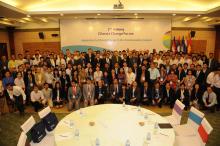On 6-8th October 2014, three representatives from MMA/JBA took part in the 2nd Mekong Climate Change Forum, in Siem Reap, a town that serves as a gateway to the world heritage site of Angkor, the centre of one of the world's largest urban populations 1000 years ago. The urgency of the task ahead is plain and the Forum a wake up call for speedy action to plan and be prepared through integration of climate action into development.
The focus of the forum was adaptation to climate change in the transboundary context. The Lower Mekong Basin (LMB) has in recent years experienced rapid development, urbanisation, and population growth, but at the same time is experiencing the effects a changing climate. As a result, the environment is being subject to increasing pressures, the effects of which are felt by the communities living there. For example the delta is experiencing larger extremes in the seasons, resulting in both drought and flooding, and sea level rise is causing salt intrusion to the ecosystems and farmland. Adaptation strategies are therefore crucial to helping those vulnerable communities, governments, and other stakeholders to better manage the effects of climate change, thereby reducing the consequences on people and their livelihoods, ecosystems, and economies. The Mekong Adaptation Strategy and Action Plan (MASAP) is surely needed 'ASAP'.
The keynote speaker, Dr Eugene Stakhiv, Lecturer and Researcher at Johns Hopkins University, delivered a thought-provoking presentation on ‘Lessons for Practical Adaptaion Management Planning.’ He discussed the various ‘top down’ adaptation measures currently being adopted at basin level, and introduced the fact that ‘bottom up’ methods may be more beneficial. If you first define the system’s breaking points, link these to multiple climatic data sources, then assess the plausibility and test the vulnerability, more pragmatic and longer term sustainability may be achieved in the face of climate variability and change.
The plenary and parallel sessions included discussions on flood and drought, ecosystems and biodiversity, and agriculture and fisheries, all relating back to adaptation approaches. Dialogue with fellow colleagues working in the Mekong Basin and other transboundary river basins such as the Danube provided a view on how to address climate change in the LMB to achieve long term sustainability.
MMA’s Anthony Green presented some of our current work on Floodplain Development and Climate Change. He discussed the role of the floodplain and its importance in integrated water resource management for sustainable development in a transboundary context. The need to maintain both the storage and conveyance roles of the floodplain is threatened by the many pressures; from urbanisation and industrialisation, to the effects of climate change. He presented some preliminary results to illustrate sensitivity to flow changes of different settlements in the LMB, and demonstrated how transboundary flood risk management should be a key part of future development plans for development, adaptation and disaster management.

